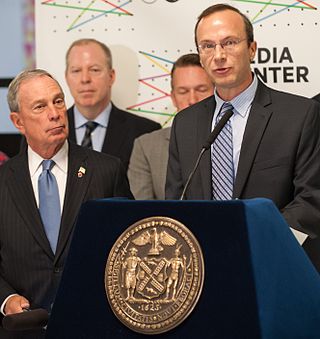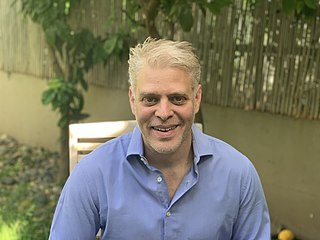
Jürgen Schmidhuber is a German computer scientist noted for his work in the field of artificial intelligence, specifically artificial neural networks. He is a scientific director of the Dalle Molle Institute for Artificial Intelligence Research in Switzerland. He is also director of the Artificial Intelligence Initiative and professor of the Computer Science program in the Computer, Electrical, and Mathematical Sciences and Engineering (CEMSE) division at the King Abdullah University of Science and Technology (KAUST) in Saudi Arabia.

Ron Kimmel is a professor of Computer Science and Electrical and Computer Engineering at the Technion Israel Institute of Technology. He holds a D.Sc. degree in electrical engineering (1995) from the Technion, and was a post-doc at UC Berkeley and Berkeley Labs, and a visiting professor at Stanford University. He has worked in various areas of image and shape analysis in computer vision, image processing, and computer graphics. Kimmel's interest in recent years has been non-rigid shape processing and analysis, medical imaging, computational biometry, deep learning, numerical optimization of problems with a geometric flavor, and applications of metric and differential geometry. Kimmel is an author of two books, an editor of one, and an author of numerous articles. He is the founder of the Geometric Image Processing Lab, and a founder and advisor of several successful image processing and analysis companies.

Luca Maria Gambardella is an Italian computer scientist and author. He is the former director of the Dalle Molle Institute for Artificial Intelligence Research in Lugano, in the Ticino canton of Switzerland. He is currently the prorector of Università della Svizzera italiana, where he directs the Master of Science in Artificial Intelligence degree course.
Alex Bronstein is an Israeli computer scientist and serial technologist. He is a professor of Computer Science and Machine Learning at Technion, where he holds the Dan Broida Academic Chair and the Schmidt Chair in Artificial Intelligence. He is also a fellow of the IEEE for his contribution to 3D imaging and geometry processing.

Manuela Maria Veloso is the Head of J.P. Morgan AI Research & Herbert A. Simon University Professor Emeritus in the School of Computer Science at Carnegie Mellon University, where she was previously Head of the Machine Learning Department. She served as president of Association for the Advancement of Artificial Intelligence (AAAI) until 2014, and the co-founder and a Past President of the RoboCup Federation. She is a fellow of AAAI, Institute of Electrical and Electronics Engineers (IEEE), American Association for the Advancement of Science (AAAS), and Association for Computing Machinery (ACM). She is an international expert in artificial intelligence and robotics.

Yann André LeCun is a French-American computer scientist working primarily in the fields of machine learning, computer vision, mobile robotics and computational neuroscience. He is the Silver Professor of the Courant Institute of Mathematical Sciences at New York University and Vice President, Chief AI Scientist at Meta.

Massimiliano Versace is the co-founder and the CEO of Neurala Inc, a Boston-based company building Artificial Intelligence emulating brain function in software and used in automating the process of visual inspection in manufacturing. He is also the founding Director of the Boston University Neuromorphics Lab. Massimiliano Versace is a Fulbright scholar and holds two PhDs in Experimental Psychology from the University of Trieste, Italy and Cognitive and Neural Systems from Boston University, USA. He obtained his BSc from the University of Trieste, Italy.

Oyekunle Ayinde "Kunle" Olukotun is a British-born Nigerian computer scientist who is the Cadence Design Systems Professor of the Stanford School of Engineering, Professor of Electrical Engineering and Computer Science at Stanford University and the director of the Stanford Pervasive Parallelism Lab. Olukotun is known as the “father of the multi-core processor”, and the leader of the Stanford Hydra Chip Multiprocessor research project. Olukotun's achievements include designing the first general-purpose multi-core CPU, innovating single-chip multiprocessor and multi-threaded processor design, and pioneering multicore CPUs and GPUs, transactional memory technology and domain-specific languages programming models. Olukotun's research interests include computer architecture, parallel programming environments and scalable parallel systems, domain specific languages and high-level compilers.

Fei-Fei Li is a Chinese-American computer scientist known for establishing ImageNet, the dataset that enabled rapid advances in computer vision in the 2010s. She is the Sequoia Capital professor of computer science at Stanford University and former board director at Twitter. Li is a co-director of the Stanford Institute for Human-Centered Artificial Intelligence and a co-director of the Stanford Vision and Learning Lab. She served as the director of the Stanford Artificial Intelligence Laboratory from 2013 to 2018.

Craig Gotsman is a professor of Electrical and Computer Engineering at the University of Miami. He was a distinguished professor of Computer Science and Dean of the Ying Wu College of Computing at New Jersey Institute of Technology (NJIT) between 2017-2023. Prior, he was one of the founders of the Cornell Tech campus in New York City and the founding director of the joint Jacobs Technion-Cornell Innovation Institute there.

Francesca Rossi is an Italian computer scientist, currently working at the IBM Thomas J. Watson Research Center as an IBM Fellow and the IBM AI Ethics Global Leader.
Carol Elizabeth Reiley is an American business executive, computer scientist, and model. She is a pioneer in teleoperated and autonomous robot systems in surgery, space exploration, disaster rescue, and self-driving cars. Reiley has worked at Intuitive Surgical, Lockheed Martin, and General Electric. She co-founded, invested in, and was president of Drive.ai, and is now CEO of a healthcare startup, a creative advisor for the San Francisco Symphony, and a brand ambassador for Guerlain Cosmetics. She is a published children's book author, the first female engineer on the cover of MAKE magazine, and is ranked by Forbes, Inc, and Quartz as a leading entrepreneur and influential scientist.

Pieter Abbeel is a professor of electrical engineering and computer sciences, Director of the Berkeley Robot Learning Lab, and co-director of the Berkeley AI Research (BAIR) Lab at the University of California, Berkeley. He is also the co-founder of Covariant, a venture-funded start-up that aims to teach robots new, complex skills, and co-founder of Gradescope, an online grading system that has been implemented in over 500 universities across the USA. He is best known for his cutting-edge research in robotics and machine learning, particularly in deep reinforcement learning. In 2021, he joined AIX Ventures as an Investment Partner. AIX Ventures is a venture capital fund that invests in artificial intelligence startups.
Animashree (Anima) Anandkumar is the Bren Professor of Computing at California Institute of Technology. Previously, she was a senior director of Machine Learning research at NVIDIA and a principal scientist at Amazon Web Services. Her research considers tensor-algebraic methods, deep learning and non-convex problems.

Joseph (Yossi) Keshet is an Israeli professor in the Electrical and Computer Engineering Faculty of the Technion, where he is the director of the Speech, Language, and Deep Learning Lab. His research focuses on human speech and machine learning.

Samy Bengio is a Canadian computer scientist, senior director of Artificial Intelligence and Machine Learning Research at Apple, adjunct professor at École Polytechnique Fédérale de Lausanne, and a former long-time scientist at Google known for leading a large group of researchers working in machine learning including adversarial settings. Bengio left Google shortly after the company fired, Timnit Gebru, without first notifying him. At the time, Bengio said that he had been "stunned" by what happened to Gebru. He is also among the three authors who developed Torch in 2002, the ancestor of PyTorch, one of today's two largest machine learning frameworks.
Jiaya Jia is a Chair Professor of the Department of Computer Science and Engineering at The Hong Kong University of Science and Technology (HKUST). He is an IEEE Fellow, the associate editor-in-chief of one of IEEE’s flagship and premier journals- Transactions on Pattern Analysis and Machine Intelligence (TPAMI), as well as on the editorial board of International Journal of Computer Vision (IJCV).
Diyi Yang is a Chinese computer scientist and assistant professor of computer science at Stanford University. Her research combines linguistics and social sciences with machine learning to build more socially-aware language technologies, including user-centered text generation, and NLP for limited data settings like dialectal variation and low-resourced languages.

Moshe Shoham is a professor emeritus in the faculty of mechanical engineering at the Technion - Israel Institute of Technology.
Vladlen Koltun is an Israeli-American computer scientist and intelligent systems researcher. He currently serves as distinguished scientist at Apple Inc. His main areas of research are artificial intelligence, computer vision, machine learning, and pattern recognition. He also made a significant contribution to robotics and autonomous driving.














